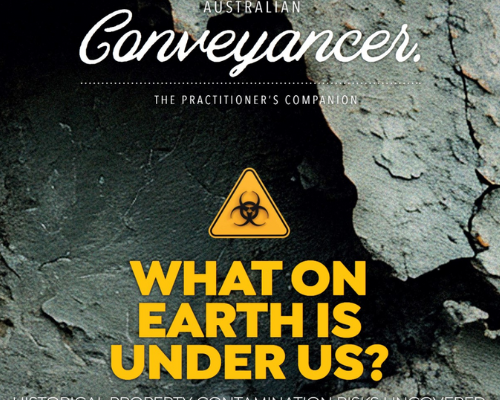Responding to the new reality
As the evidence of risk and damage by climate change becomes clear, authorities and decision-makers are steeling themselves for a future fill will new protocols and planning regulations.

WITH the evidence stark that climate disruption will have a worldwide economic, environmental and social impact in the years and decades to come, various stakeholders are formulating new policy and guidelines.
Last year the Law Society of the UK updated its guidelines for solicitors in regards to advising clients on climate change, saying solicitors had the duty of care; the duty to warn; the duty to disclose; and the duty to uphold service and competence levels.
Meanwhile the Law Society of NSW told Australian Conveyancer Magazine it is currently “developing guidance material to assist NSW practitioners to recognise where the impacts of climate change may affect their practice and their clients.”
The Society says its guidance will be published within the first half of this year.
The CEO of the Australian Institute of Conveyancers NSW, Chris Tyler says he will be waiting for the Law Society of NSW to release their guidelines before instructing any of his members regarding their obligations.
“Climate risk is an emerging risk, it is something that needs to be considered in the future and we will have to see how it plays out,” he tells Australian Conveyancer Magazine. “Quite honestly there hasn’t been any claims on our Professional Indemnity relating to climate issues where a conveyancer has been sued for not advising that the property was in a flood zone, or whatever the case may be.
“We’ll wait and see. There is no legal precedent for it to occur that there is a duty on behalf of the conveyancer and so we’ll see how the market develops.”
Tyler believes the onus of obtaining a climate risk report should really be the responsibility of other parties including the purchaser.
“When you talk about the best ways for prospective homeowners or investors to minimise risks, they have to go into it with their eyes open,” he explains. “I mean, if you’re going to buy a home at Collaroy on the beach, it has got the potential in 20 years to be undermined or affected by climate change. Don’t go back to the conveyancer and say, ‘I could have bought a climate risk report which would have indicated that’.
“You’d have to be living under a mushroom to not know about climate change, and so if you were buying a property in the Blue Mountains or in the Lismore town centre and you don’t know about the potential for either fire or flood, unfortunately you’re a mug.
“Conveyancers do talk to their clients about those risks and they are on the 149 planning certificates from the councils. What I suppose I am saying is, don’t try and shift the risk to the conveyancer. Be a prudent purchaser.”
While he awaits the Law Society’s guidance, Tyler says he believes a climate risk report could certainly be a requirement for real estate agents and the listing of any property.
“I would have thought that would have been a more prudent use of any climate risk reports that can be purchased, than waiting until it’s the conveyancer’s problem, and either supply the risk assessment for when the property is being purchased or the vendors want it listed.”
Meanwhile, The Law Council of Australia’s current advice for its members states: “Australia’s laws, the legal profession, legal education and legal practice must all keep pace with the challenges and opportunities created by climate change.
“Lawyers should be alive to the unfolding legal implications of climate change and its consequences, and they should be informed, skilled and ready to assist clients on climate change-related legal matters, within their areas of skill and competence.”
And the Australian Property Research and Education Fund warns in its Valuation@Risk report that property valuers should take heed to the changing climate landscape with their property valuations.
“Valuers need to be particularly aware of market activity and consideration of climate change risks, risk exacerbation and transition risks, particularly as change in global reporting frameworks and emissions targets are driven by market forces and likely regulation, that will have substantial impact and influence on property stakeholder decision making.
“This ultimately comes back to the valuer having performed the appropriate levels of due diligence, considered the market position and any influences, made the appropriate collection and consideration of comparable data, and made a decision on the market value in the process of the valuation.”
POTENTIAL CLIMATE COMPLIANCE ISSUES
Analysis from Groundsure cautions conveyancers and property lawyers may face potential compliance issues when it comes to climate change related matters, including:
Implications to property investment clients:
- Exposure to higher insurance premiums
- The knock on to mortgage availability
- The risk of catastrophic loss both financially and physically (bushfire and coastal erosion).
Implications to law firms:
- Exposure to litigation from failing to advise
- Reputational damage
- Wider Environmental Social Governance (ESG) compliance risks.
And Groundsure warns of the possible consequences lawyers and conveyancers may face if they fail to advise their clients of the potential climate risks:
• Claims made against them in negligence and also with respect to misleading or deceptive conduct;
• Damages ordered against them
- Loss of business and increased professional indemnity insurance premiums
- Disciplinary action, by the applicable disciplinary body, which in NSW is The Office of the NSW Legal Services Commissioner.




